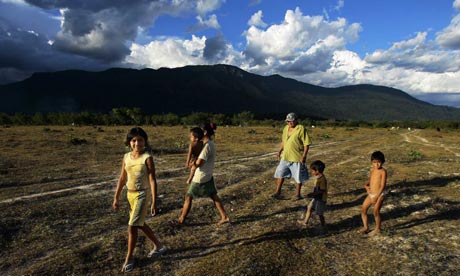Environment: Fate of Amazon tribes on trial
posted on
Aug 25, 2008 07:23PM

Crystallex International Corporation is a Canadian-based gold company with a successful record of developing and operating gold mines in Venezuela and elsewhere in South America


An indigenous Macuxi family walks in the Raposa Serra do Sol reservation in Roraima state, Brazil. Photograph: Marlene Bergamo/AP
Brazil is bracing for an imminent ruling on the future of one of its largest indigenous reservations - a decision that campaigners claim could spell disaster for indigenous communities across the country.
The supreme court is expected to announce its verdict tomorrow in a case brought by a group of farmers, businessmen and politicians who claim the 2005 creation of the Raposa Serra do Sol reservation was "unconstitutional" and are demanding the right to remain.
Located in the isolated Amazonian state of Roraima, the sprawling 1.7m-hectare (4.2m-acre) reserve was ordered by Brazil's president, Luiz Inácio da Silva, and is home to more than 18,000 aborigines from five different ethnic groups. Campaigners hailed the establishment of Raposa Serra do Sol as a historic move to protect the country's indigenous peoples from contact with the outside world.
Nearly all non-aborigines require legal permission to enter indigenous lands. But several rice farmers have continued to operate inside the reserve. They describe the demarcation of Raposa Serra do Sol as an obstacle to economic development and point to the fact that there are numerous aborigines among their employees.
Violence erupted earlier this year after government attempts to remove all non-indigenous people from the reserve. Bridges were burned and one group of aborigines was shot at, allegedly by gunmen hired by local farmers.
Paulo Cesar Quartiero, a rice farmer who was arrested earlier this year for resisting eviction, has blamed a foreign conspiracy for the creation of the reserve. "History will show who is selling Brazil and who is defending the nation," he said last week.
Many senior members of the military see the reserve - located along the borders with Venezuela and Guyana - as a threat to national security. Last year, the Brazilian military told the Guardian it believed drug traffickers may be taking advantage of the state's absence and using aborigines to smuggle cocaine into Brazil.
But campaigners say a supreme court ruling that reduced the size of the reserve or allowed non-aborigines to remain would encourage further invasions by miners, loggers and ranchers that could devastate the region's indigenous communities.
Fiona Watson, a campaigner from Survival International, a NGO, said a decision tomorrow in favour of the farmers could destroy the indigenous "way of life and set a catastrophic precedent for Indians all over the country".
During a visit to one village in the isolated reserve last year Pierlangela Nascimento da Cunha, a prominent indigenous campaigner, said the conflict over Raposa Serra do Sol was part of a wider offensive against indigenous rights. That offensive included a government bill that proposed opening up such reserves to mining companies in search of gold and diamonds.
"Brazil wants to be a big power. But this does not give it the right to steamroll over the rights of the Indians," said Cunha, who travelled to London in June to discuss the situation in Raposa Serra do Sol with British MPs and members of the Foreign Office.
"The development of our country cannot be achieved through the extinction of its indigenous people and by disrespecting their rights. The big economic interests see [aborigines] as an obstacle."